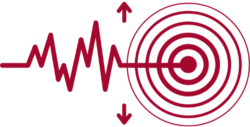
Mathematical Model Drives Demand-Responsive Transport Shift in Barcelona
Read More

Estimation of Extreme Earthquakes and Other Natural Disasters
Read More

Enhanced Encoder Resolution through Mathematical Innovation
Read More

A mathematical model conceived and computationally implemented by CRM has guided the decision on which areas of Barcelona should replace the local, fixed-bus routes, known as “Bus del Barri,” with a demand-responsive transport (DRT) service. Following exploratory research by the Dynamical Systems group UAB-CRM, a project was commissioned by Transportes Metropolitans de Barcelona (TMB) and carried out with the crucial participation of the Knowledge Transfer Unit. Thanks to the use of a genetic algorithm as the core method for optimizing routes, TMB was able to make a costly decision with significantly reduced risk.
This work has led to the replacement of five local bus routes with fixed stops (lines 118, 135, 128, 120, and 121) with five DRT zones (El Farró-Galvany, Montbau-la Vall d’Hebron, Torre Baró Nord, Torre Baró Sud, and Vallbona) by 2024, through a service called “El Meu Bus.” An additional 15 routes are being considered for such a transformation.
Five thousand passengers have already joined the app that provides access to the service, benefiting from more comfortable travel, reduced waiting times, and a lower average number of kilometres travelled, thereby encouraging greater use of public transport. The optimization of routes also results in decreased environmental impact and lower maintenance costs.


Encoders are crucial tools in industrial automation, enabling precise measurement and control of motion and position within machinery across various sectors, including packaging, energy, automotive, and textile industries. These optical sensors convert mechanical motion into electrical signals, which are then interpreted by control systems to accurately determine position, velocity, and direction of movement.
Researchers at the Complex Analysis Group at CRM, in collaboration with the innovative Catalan SME, Hohner Automáticos S.L., utilized a creative combination of discrete mathematics and harmonic analysis techniques. They implemented these techniques into an algorithm to overcome the well-known limitations of the most traditional and affordable type of encoder. This approach enabled them to increase the resolution of the encoders while maintaining low manufacturing costs.
The exclusive, patent-protected method has helped Hohner strengthen its position as a market leader in Spain, contributing to high-skilled job creation and increasing sales during the impact period (2019 onwards). This advancement has raised Hohner’s profile as an innovative and agile company in the eyes of competitors and customers.

